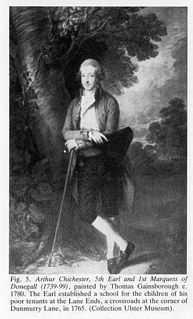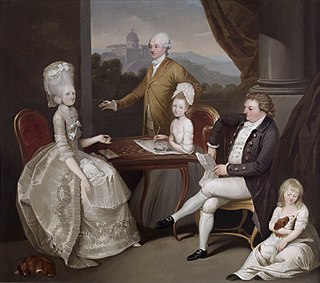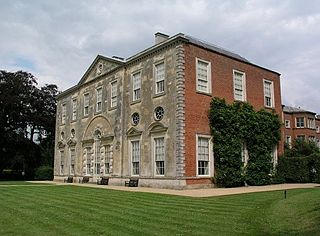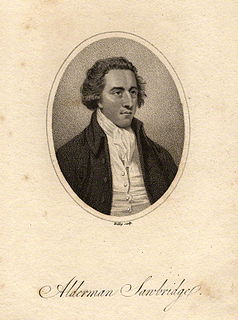Related Research Articles

Field Marshal John Campbell, 5th Duke of Argyll, styled Marquess of Lorne from 1761 to 1770, was a Scottish soldier and nobleman. After serving as a junior officer in Flanders during the War of the Austrian Succession, he was given command of a regiment and was redeployed to Scotland where he opposed the Jacobites at Loch Fyne at an early stage of the Jacobite Rebellion and went on to fight against them at the Battle of Falkirk Muir and then at the Battle of Culloden. He later became adjutant-general in Ireland and spent some 20 years as a Member of Parliament before retiring to Inveraray Castle.

Arthur Chichester, 1st Marquess of Donegall, known as Arthur Chichester until 1757 and as The Earl of Donegall between 1757 and 1791, was an English nobleman and politician in Ireland.

Aubrey Beauclerk, 5th Duke of St Albans was a British landowner, and a collector of antiquities and works of art.

Francis Ingram-Seymour-Conway, 2nd Marquess of Hertford, KG, PC, PC (Ire), styled The Honourable Francis Seymour-Conway until 1750, Viscount Beauchamp between 1750 and 1793, and Earl of Yarmouth between 1793 and 1794, was a British peer and politician. He held seats in the Irish House of Commons from 1761 to 1776 and in the British House of Commons from 1766 to 1794. He served as Chief Secretary for Ireland under his father. He subsequently held positions in the Royal Household, including serving as Lord Chamberlain between 1812 and 1822.
Midleton was a constituency represented in the Irish House of Commons until 1800. Incorporated by Charter, 1671 whereby it was granted to Sir John Brodrick with a Corporation sovereign, two bailiffs and 12 burgesses. It was disenfranchised at the Act of Union and compensation of £15,000 paid to Viscount Midleton.
General Robert Cuninghame, 1st Baron Rossmore, PC (Ire) was an Irish British Army officer and politician.
George Leslie Montgomery was an Irish politician.

James Stopford, 2nd Earl of Courtown KP, PC (Ire), known as Viscount Stopford from 1762 to 1770, was an Anglo-Irish peer and Tory politician who sat in the British House of Commons between 1774 and 1793.

Edward Garth-Turnour, 1st Earl Winterton FRS was a British politician.
James Brydges, 3rd Duke of Chandos PC, styled Viscount Wilton from birth until 1744 and Marquess of Carnarvon from 1744 to 1771, was a British peer and politician.

Ralph Verney, second Earl Verney PC, FRS, was a member of the Verney family of Middle Claydon and a British politician. From 1737 until 1752, when he succeeded to the earldom, he was styled Lord Fermanagh. He sat in the House of Commons several times between 1753 and 1791.
Lieutenant-General Edward Harvey (1718–1778) of Cleveland Court, Westminster was a British Army officer who served as Adjutant-General to the Forces.
Edward Lewis was a British politician who sat in the House of Commons between 1761 and 1790.
William Northey FRS was an English politician who sat in the House of Commons from 1747 to 1770.

John Sawbridge was an English politician who sat in the House of Commons from 1768 to 1780.
Sir John Conway Colthurst, 1st Baronet was an Anglo-Irish politician.
Cornelius O'Callaghan was an Irish politician.
Captain John Robert Jenkinson was a British Army officer, courtier and Member of Parliament.
William Lawrence or Laurence was a British politician who sat in the House of Commons on three occasions between 1761 and 1798.
John Curtis was an Irish politician.
References
- Edith Mary Johnston-Liik, ed. (2002). Members of the Irish House of Commons; Dalrymple - Jones-Nevill. History of the Irish Parliament, 1692 - 1800: commons, constituencies and statutes. Vol. 4. Belfast: Ulster Historical Foundation. ISBN 1903688132.